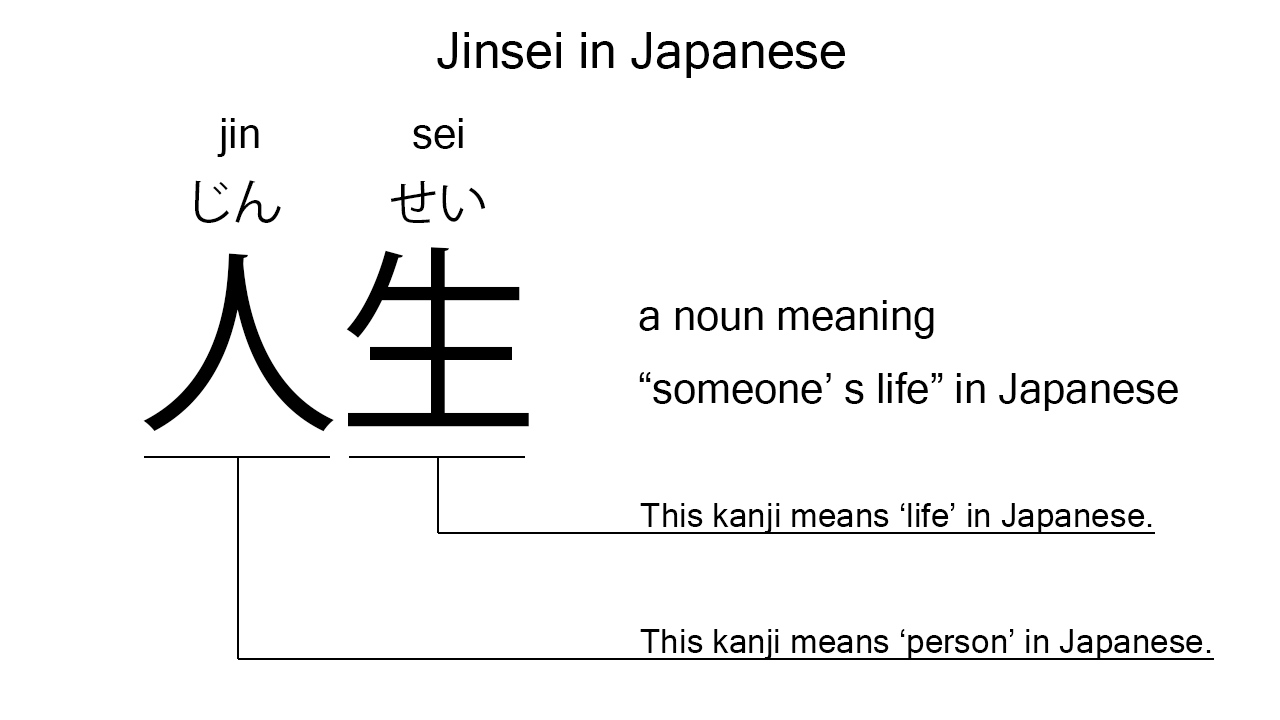What does “jinsei” mean in Japanese?
Native speakers say “jinsei” to mean ‘someone’s life’ in Japanese. Perhaps, some Japanese learners know this word as it is sometimes used in Japanese movies, songs, novels, manga, anime, and the like. In this blog post, however, I will explain this word in detail based on its kanji expression. And also, I will explain how to use it through example sentences. My explanations would help Japanese learners understand “jinsei” more clearly. Then, let’s get started!
Contents
Definition and meanings of “jinsei”
Let me start with the definition and meanings of “jinsei”.
- jinsei – 人生 (じんせい) : a noun meaning ‘someone’s life’ or just ‘life’ in Japanese. This can also work as plural. Learn more about Japanese plural.
Native speakers use this noun to refer to the period between someone’s birth and death in Japanese. So, the usage is similar to that of the English noun, “life”, I think.
The definition and meanings are simple and clear. To understand this noun more clearly, however, let me explain its kanji characters in detail, one by one.
What does “jinsei” literally mean in Japanese?
The kanji expression of “jinsei” consists of the following two kanji characters:
- 人 : a kanji character used to mean ‘person’ or ‘people’ in Japanese.
- 生 : a kanji character used to mean ‘life’ in Japanese. This can also be found in other words like “sensei“.
These two kanji characters tell us that “jinsei” literally means person’s life in Japanese. What the kanji characters express is, therefore, completely in line with the actual meanings.

When we meet new kanji expressions, we should check their kanji characters in detail to understand their meanings clearly and deeply. In many cases, kanji characters tell us a lot about the meanings of the expressions they form. Actually, here, we could get the better understanding of “jinsei” through the detailed kanji check above.
So far, I’ve explained the definition and meanings of “jinsei” together with its kanji characters. Then, let me explain how to use it through the example sentences below.
Example #1: how to say “my life” in Japanese
watashi no jinsei wa totemo tsumaranai – 私の人生はとてもつまらない (わたしのじんせいはとてもつまらない)
My life is very boring.
Below are the new words used in the example sentence.
- watashi – 私 (わたし) : a pronoun meaning ‘I’ in Japanese.
- no – の : a case particle used after a noun or pronoun to make its possessive case. In the example, this is used after “watashi” to make its possessive case, “watashi no“, which means ‘my’ in Japanese.
- wa – は : a binding particle working as a case marker or topic marker. In the example, this works after the noun phrase, “watashi no jinsei”, to make the subject in the sentence.
- totemo – とても : an adverb of degree meaning ‘very’, ‘much’, ‘so’, or such in Japanese. In the example, this works in front of “tsumaranai” to emphasize its meaning.
- tsumaranai – つまらない : an i-adjective meaning ‘boring’ in Japanese.
This is a typical usage of “jinsei”. In this example, it works together with the possessive case, “watashi no”, to say “my life” in Japanese.
Example #2: another usage of “jinsei”
kanojo no jinsei wa mijikakat ta – 彼女の人生は短かった (かのじょのじんせいはみじかかった)
Her life was short.
Below are the new words used in the example sentence.
- kanojo – 彼女 (かのじょ) : a pronoun meaning ‘she’ in Japanese.
- no – の : the same as used in the last example. In this example, however, this works after “kanojo” to make its possessive case, “kanojo no”, which means ‘her’ in Japanese.
- mijikakat – 短かっ (みじかかっ) : one conjugation of the i-adjective, “mijikai“, which means ‘short’ in Japanese. In the example, it has been conjugated for the better connection with its following word.
- ta – た : an auxiliary verb used after a verb, adjective, or auxiliary verb to make its past tense form. Probably, this is well known as a part of Japanese ta form. In the example, this works after “mijikakat” to make its past tense form, “mijikakat ta”.
This is another typical usage of “jinsei”. In this example, it works together with the possessive case, “kanojo no”, to say “her life” in Japanese. When we want to refer to someone’s life in Japanese, anyway, “jinsei” is always a very good option.
Summary
In this blog post, I’ve explained the definition and meanings of “jinsei” in detail based on its kanji expression. And also, I’ve explained how to use it through the example sentences. Let me summarize them as follows.
- jinsei – 人生 (じんせい) : a noun meaning ‘someone’s life’ or just ‘life’ in Japanese. This can also work as plural. Japanese native speakers use this noun to refer to the period between someone’s birth and death. So, the usage is similar to that of the English noun, “life”, I think. These two kanji characters literally mean person’s life in Japanese. What the kanji characters express is, therefore, completely in line with the actual meanings.
Hope my explanations are understandable and helpful for Japanese learners.